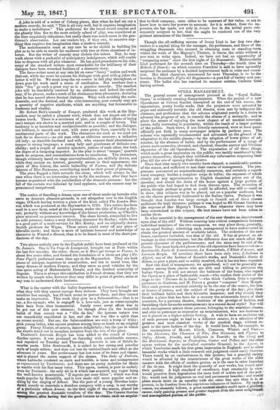What is the matter with the ballet department at Covent
Garden? Do what they will they cannot emerge from dulness. They have brought out novelties fast enough, but ill-luck seems to pursue them, and they cannot make an impression. This week they give us a Salamandrine,—that is to say, a fire-nymph; who is engageti in a love-tale, just as water-nymphs have been from time immemorial. Surely some novel effect was to be got out of this new element; for though Alma (in the beautiful ballet of that name) was a " fille du feu," the igneous nature was not remarkably manifested in her, and she was less like a spirit than an errant mortal. Rut no; the Salamandrines are only a troop of whity- pink young ladies, who cannot produce among them so much as an original group. Fanny Elssler, of course, dances delightfully; but the pas in which she excels stand out in complete isolation from the rest of the piece. Donizeufs Lucrezia Borgia has been added to the round of Covent Garden operas: it was produced on Saturday with considerable success, and repeated on Tuesday and Thursday. Lucrezia is one of Grisi's fa- vourite parts. Like Semiramide, it is suited to her strong and peculiar style of tragic action; and does not lose its verisimilitude and effect as she advances in years. Her performance has lost none of its force and vigour, and is almost the entire support of the drama. The Duke of Ferrara, whom Lablache rendered so stern and terrible, is tame and unimpressive as represented by Tamburini; and there are no pretty melodies for Mere) to warble with his Eue tenor voice. This opera, indeed, is poor in melody even for Donizetti: the only air in it which has acquired any vogue being the well-known anacreontic, "II segreto per esser felice"; which was first made popular by Brambilla, and is now made still more popular and ex- citing by the singing of Alboni. But the part of a young libertine intro- duced merely to entertain a drunken company with a song, is not worthy of a performer whose Arsace, on the first night of the season, placed her among the greatest dramatic vocalists of the day. The Covent Garden dement, after having had the good fortune to obtain such an aoquisi- I
tion to their company, seem either to be unaware of her value, or not to know how to turn her powers to account; for it is evident, from the im- pression she has made, not only in Arsace but in the trivial parts sub- sequently assigned to her, that she might be rendered one of the very greatest attractions of the theatre.


























 Previous page
Previous page